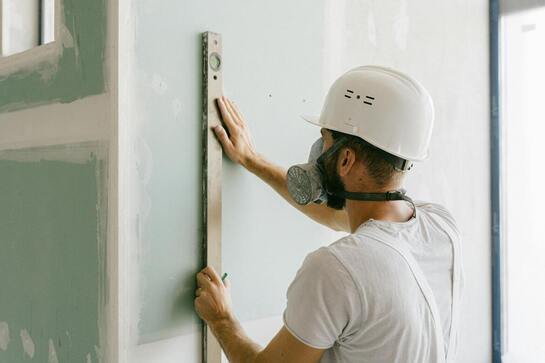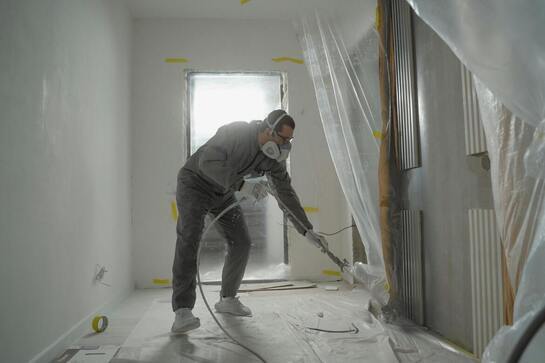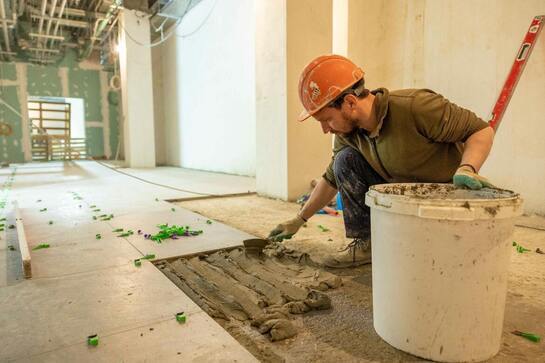Every wall you finish supports the bigger picture. Let us help you protect it. With over 50 years of experience and access to 60+ top-rated insurance companies, Pepper, Johnstone & Company builds insurance programs that help drywall contractors stay protected from jobsite to final coat.
Drywall Contractor Insurance
from Pepper, Johnstone & Company
From framing out interiors to final sanding and texture, drywall installation is detailed work with high expectations. One misstep—whether it’s an injury, a cracked finish, or accidental property damage—can lead to costly delays or legal headaches.
Your insurance policy should be as polished as the work you do.
At Pepper, Johnstone & Company, we understand the exposures drywall contractors face. We work with more than 60 insurance companies to build tailored protection plans that cover your tools, your team, and your liability, so you can keep every project moving smoothly.
Why Insurance Matters for Drywall Professionals
Drywall work might look simple to outsiders, but the risks are very real. Whether you're lifting 12-foot sheets, navigating tight interiors with scaffolding, or finishing around delicate fixtures, accidents happen fast.
Even one slip, cracked wall, or tool mishap can create costly financial losses or workplace injuries. The right insurance coverage helps drywall contractors:
- Satisfy client contract requirements
- Protect against third-party property damage
- Cover employees hurt on the job
- Respond to tool or material theft
- Shield the business from employment disputes or lawsuits
Without insurance, these risks can derail your entire operation.
Essential Coverage Options for Drywallers
Most drywall businesses benefit from a layered policy that includes:
General Liability Insurance
Covers property damage or injury claims from accidents, such as damaging a homeowner’s flooring or causing a fall hazard with unsecured materials.
Workers’ Compensation Insurance
Provides wage replacement and medical bill coverage for employees injured during installs, overhead lifts, or finishing work.
Commercial Property Insurance
Protects your office, storage spaces, and business-owned items like taping tools, lifts, ladders, and drywall stock.
Commercial Umbrella Insurance
Adds extra liability protection when claims exceed the limits of your other policies—critical for larger jobs or subcontractor disputes.
Commercial Auto Insurance
Covers work trucks and trailers used to transport crews and materials. It includes liability, collision, and physical damage.
Employment Practices Liability Insurance (EPLI)
Protects your business from legal fees related to wrongful termination, discrimination, harassment, or wage issues.
Fiduciary Liability Insurance
Covers mistakes in managing employee benefits, such as retirement accounts or healthcare contributions.
Crime Insurance
Covers the costs of losses related to internal theft, employee fraud, forgery, or dishonest behavior.
Specialized Insurance Coverage for Drywall Projects
Drywall hangers rely on mobile gear, transportation, and tight coordination on active job sites. These specialty coverages help round out your protection:
Builders’ Risk Insurance
Builders’ risk insurance covers drywall materials and installed work during the construction process. It helps protect against loss from theft, vandalism, or weather damage before the project is completed.
Inland Marine Insurance
Inland marine insurance protects tools, equipment, and jobsite materials in transit or stored in vehicles. This includes lifts, tapers, drills, and cutting gear.
Surety Bonds
Surety bonds provide a financial guarantee that your company will meet contract obligations. Bonds are often required for commercial work and government projects.
Protect More Than Just the Job Site
Each project may end with a smooth finish, but business risks are ongoing. We help drywall business owners think beyond the walls by protecting against:
- Lawsuits from subcontractors or employees
- Delays caused by damaged materials or weather exposure
- Cyberattacks targeting scheduling or billing systems
- Tool theft from parked vehicles or mobile storage
- Damage claims tied to improperly finished work
We help keep your policy aligned with real-world exposures and your business goals.
Why Choose Pepper, Johnstone & Company
As an independent insurance agency, Pepper, Johnstone & Company works with over 60 top-rated carriers to help you find the right fit at the right price. We understand construction risk and take a consultative approach to every account.
We analyze your job mix, crew size, equipment usage, and subcontractor relationships. Then we create a coverage plan that protects your drywall business on every level—from daily install work to large-scale commercial bids.
Frequently Asked Questions About Insurance for Drywallers
What drywall contractors need to know
Most need general liability, workers’ comp, commercial auto, and inland marine insurance. Depending on your business size and the types of projects you take on, you may also need builders’ risk, umbrella liability, and surety bonds. These policies help manage legal, safety, and equipment risks.
It depends. If your team accidentally causes damage during installation or finishing, general liability can help cover repair or replacement costs. However, workmanship claims and re-dos are often excluded. We can help you explore optional endorsements or coverage extensions.
Premiums vary based on employee count, payroll, vehicle use, and claims history. A small team may pay under $200/month for a base policy, while larger operations need broader coverage. We compare rates from multiple insurance companies to find your best fit.
Not by default. Standard property insurance typically excludes items in transit or stored off-site. Inland marine coverage fills that gap by protecting tools and materials wherever the job takes you.
Workers’ comp insurance covers medical bills, lost wages, and rehab if an employee gets hurt lifting, installing, or finishing drywall. Most states require it because it’s essential for protecting both your crew and your business.
Surety bonds provide financial assurance that your business will fulfill contract terms. They’re often required for public and commercial jobs and help you remain competitive in the bidding process.
What do people think about us?
We’re trusted by contractors who build better from the inside out.
I started a company in January 2019 & the team at Pepper Johnstone helped me from the beginning. We serve mid-cap to large public companies in Alabama, Colorado and Texas. And, Bryan has been critical in helping us meet and maintain the required commercial insurance policies and coverage levels. Key reasons that I've been so pleased primarily include their high level of technical competence and timely responsiveness on new or changing insurance coverage requests. They do a great job & I can highly recommend them.
We are very pleased with our services that Pepper, Johnstone and Company provide for us! Both with business and personal needs, we feel like we are receiving excellent resources. We truly would not trust anyone else for our insurance needs!
Thankful for the opportunity to work with Pepper, Johnston’s and Co. They helped us add basic insurance needs for our newly formed LLC. The responsiveness, willingness to answer numerous questions, and guide us through multiple options was greatly appreciated. I’d like to especially thank Meredith Baswell of their staff who helped us through the process. I’d recommend you seek their advice and input on commercial and personal insurance options.
This is the best insurance agency hands down. We have our home, car, and business insurance through them. Julie has always gone above and beyond to help us. We wouldn’t use anyone else.
Pepper Johnstone has handled my personal and business insurance needs for years. They do good work and their staff is amazing! They are independent agents so they have access to several different lines of insurance to meet the needs of their clients. I highly recommend them.
Pepper, Johnstone is a very professional and responsive insurance company. They were able to assist me with a full suite insurance solution very promptly and at a great value. Most importantly, I felt completely comfortable that I was being handled by true professionals. Bryan Johnstone is great at his job and I would recommend him highly to anyone who needs insurance advice for themselves or their business.
Insurance Articles
from the Pepper, Johnstone & Company blog
Let’s Build Your Drywall Insurance Plan
From first panel to final finish, we’ll help you stay protected. Call Pepper, Johnstone & Company at 866-865-3499 or request a quote online to build an insurance plan designed for your drywall business.







